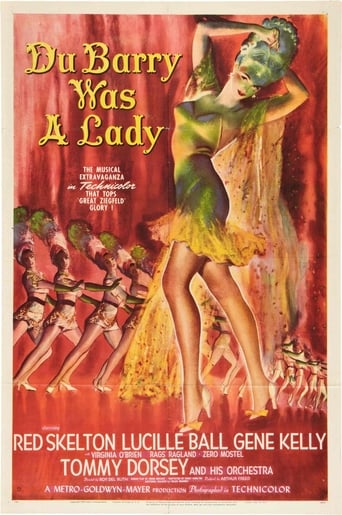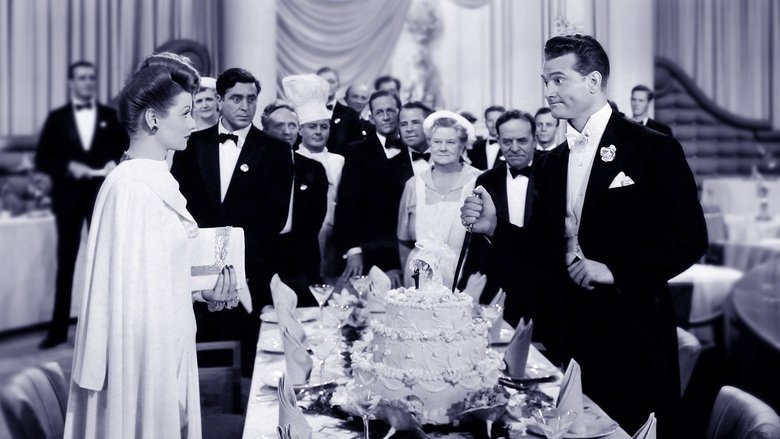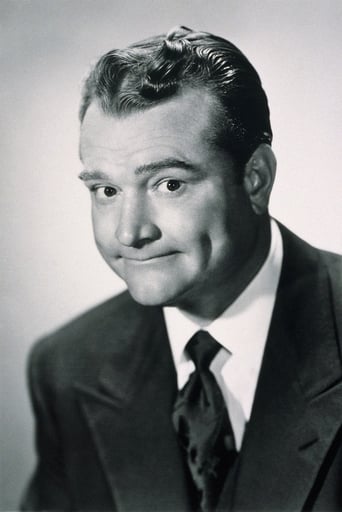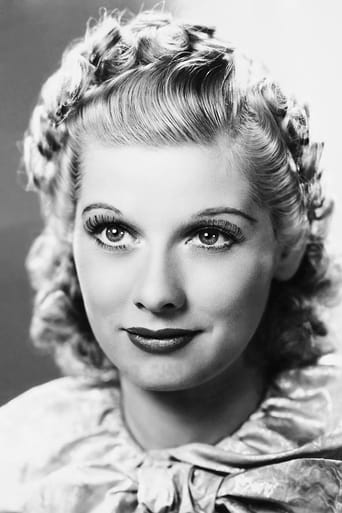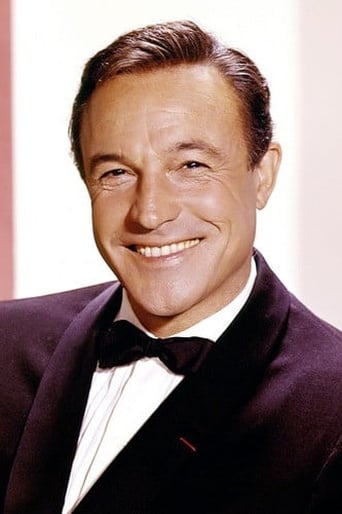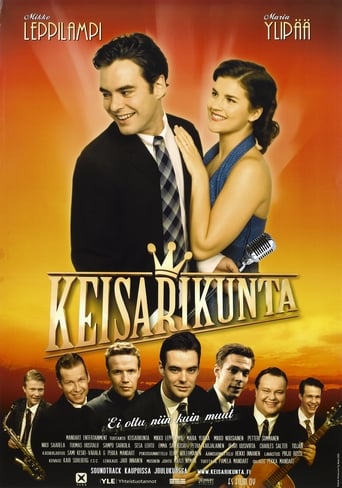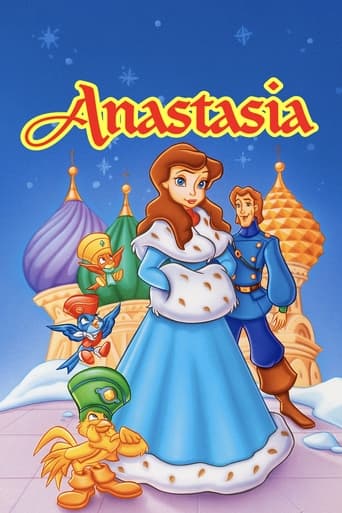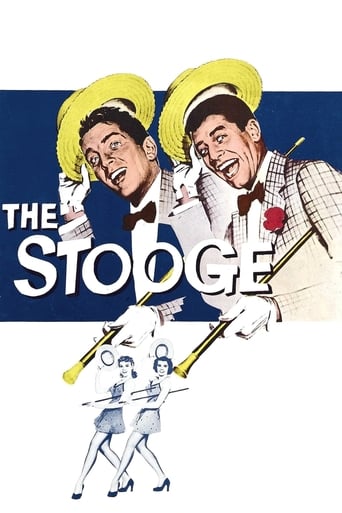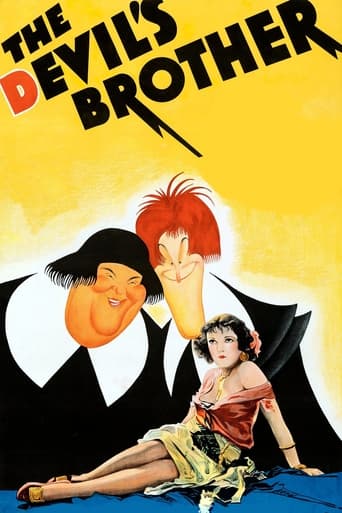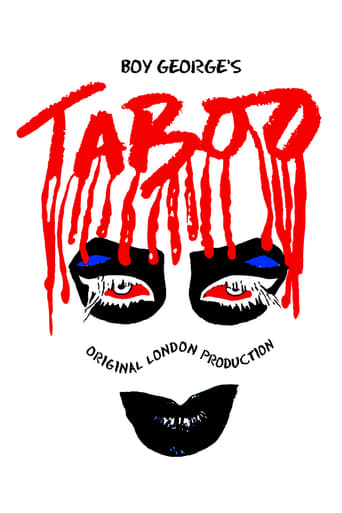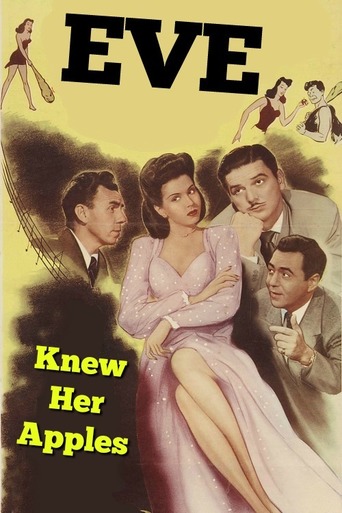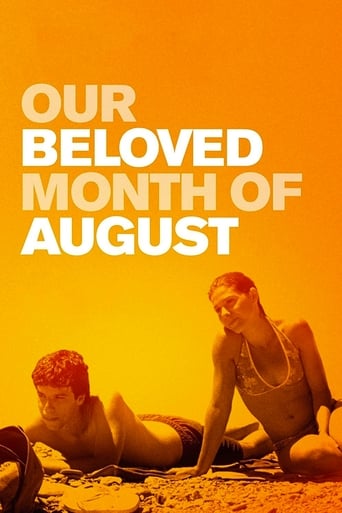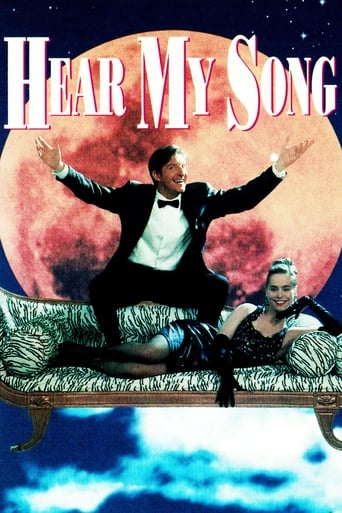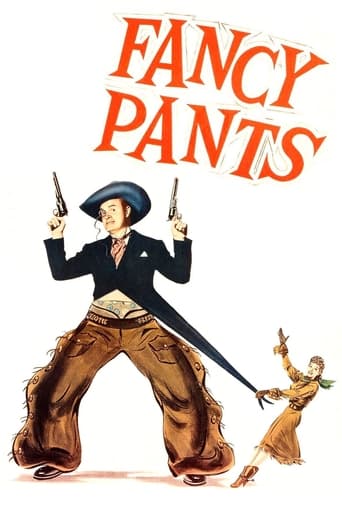Du Barry was a Lady (1943)
Hat check man Louis Blore is in love with nightclub star May Daly. May, however, is in love with a poor dancer but wants to marry for money. When Louis wins the Irish Sweepstakes, he asks May to marry him and she accepts even though she doesn't love him. Soon after, Louis has an accident and gets knocked on the head, where he dreams that he's King Louis XV pursuing the infamous Madame Du Barry.
Watch Trailer
Cast


Similar titles
Reviews
MGM bought a seventeen song musical comedy, threw out thirteen songs ("It Ain't Etiquette", "Well, Did You Evah", and "But In The Morning, No" can still be heard as backg round music) and had five studio composers take care of the rest of the score ("Salome" is their best contribution).The plot--Film takes place in a nightclub. Louis (Skelton) is in love with May (Lucille Ball). After he accidentally drinks a Mickey, he dreams he's back in 1743 France, where he is Louis XV, and May is Madame DuBarry.To me, Skelton is unbearable when he plays stupid; here, he takes forever to get the idea he's back in France, and tramples jokes into the ground. I don't know if that's his fault or the fault of director Del Ruth.Ball is good as May/Madame DuBarry. She saves the second half of the film with her comedy skills where she makes a fool out of Louis XV. She is dubbed for most of her songs, but her real voice can be heard in the song "Friendship".Gene Kelly is good as Alec/The Black Arrow. He has the best song ("Do I Love You") and an excellent dance number on the nightclub stage.Virginia O'Brien makes "Salome" a memorable song. Look for Marilyn Maxwell in a bit , and Lana Turner in an uncredited bit.
There have been quite a few films dealing with the life of 18th century French courtesan Madame Du Barry. But, I'll bet none of the others remotely approach this treatment. Actually ,only about the last half features the court of Louis XV, with Lucille Ball as the Madame. It's essentially a lavish musical variety farce, loosely based on the play of the same title. Most of Cole Porter's songs have been deleted for the film, and new ones added. Among Porter's songs retained are "Do I Love You?" , "Katie Went to Haiti", and "Friendship". Many details of the screenplay were also altered from the play. Apparently, The Black Arrow component was tacked on to the film version. The Black Arrow was the hero of a R.L. Stevenson novel set in 15th century England. Thus, there is no historical connection to 17th century France.We have 3 multitalented leads in Red Skelton as Louis XV, Lucy as Madame Du Barry, and Gene Kelly as The Black Arrow. They, along with various others, alternate between singing, dancing, verbal and physical comedy, and strait story. Also present is Virginia O'Brien, as the cigarette girl, who wants to marry a reluctant Skelton, as Louis, the hat check man who morphs into Louis XV in his drug and bumped head-induced dream. Virginia gets to sing "Salome" in her trademark deadpan style, which enjoyed some popularity as a novelty during this era.This was Lucy's first Technicolor film, and she took advantage of it by dying her hair a bright orange. She sure looked great throughout, along with many other beautiful ladies who were shown for just a few moments. This was also her first MGM film, having been acquired from RKO. This was only Kelly's second Hollywood film and, again, his first in Technicolor. Skelton had been kicking around MGM for a few years. However, this is probably also his first Technicolor film.Kelly and Lucy would later develop much more of a comedic dimension to their acting. Probably 90% of the comedy here was generated by Skelton, with some input from Rags Ragland and Zero Mostel. The latter played a swami who parodies Charles Boyer, especially in "Algeria". The opening chorus girls also have Swami turbans. The Swami theme soon disappeared.Kelly gets one solo dance routine in tux and tails, not especially innovative. Otherwise he spends his time mooning over Lucy's character or playing The Black Arrow, who wants to lead a revolution against the French monarchy. The Tommy Dorsey Band gets more exposure here than in other films I've seen. This sometimes includes The Pied Pipers, including Jo Stafford. I definitively prefer Jo's recorded version of "Do I Love You" over Kelly's singing here. The 3 Oxford boys do an amusing vocal parody of some of the popular dance bands of the day, including : Kay Kaiser, Fred Warring, Harry James, and Guy Lombardo.The basic plot is a romantic foursome, where it's not crystal clear who is going to end up with whom until the finale: a very common plot in musicals of that era. Skelton's and Kelly's characters both want to marry Lucy's character. But she rejects both because they aren't rich enough. She does have some romantic feelings for Kelly, but not Skelton. However, Skelton wins the Irish Sweepstakes. Now , he feels confident in asking Lucy to marry him. She has said it's better to marry for money than love. She tentatively agrees to marry him. However, he soon is bankrupt, having spent or given away all his money except what he owes the IRS. See the ending to find out how things work out. The finale has the principals singing "Friendship".
I noticed that one reviewer called this film 'choppy' and I think this is a very apt description. Unlike the typical musical, "Du Barry Was a Lady" was very choppy--mostly because there was scant plot and too many songs. Because of this, it often comes off like a talent show more than a movie.This is a very unusual film in that Lucille Ball is cast as a sex symbol. Now I am NOT trying to be mean, but Ball was mostly considered to be a goof-ball in films--a lightweight second banana, not a star...and not a siren. It's also odd because it's a musical and in some numbers, she's clearly being dubbed. Because of this and her later "I Love Lucy" persona, it is hard today to see why all the guys are going gaga over her in the film...but they are. Her main admirers are Red Skelton and Gene Kelly. Because Kelly was very much a newcomer in films, he gets third billing. A very odd fourth was Zero Mostel (in his first film). I say odd because he was cast in a role much like you'd expect to see Phil Silvers--as the goofy friend. This role just didn't work well and his part seemed rather forced. Plus, with him, Skelton and Rags Ragland, the film was made up almost exclusively of comic relief! About 2/3 of the film was set in the present--wartime USA. The only Du Barry is a character Lucile Ball plays in a nightclub. As I said above, all the guys seem nuts for her. She loves one of them (Gene Kelly) but won't give him the time of day because he's poor--and she wants a rich husband. The other (Red Skelton) is poor but unexpectedly wins the Irish Sweepstakes and because of this, Lucille seems very willing to marry him. However, before they marry, Red accidentally slips himself a Mickey Finn and in his delirium, he dreams he's Louis XV and Lucille is really Madame Du Barry. And, when he awakens, he realizes that he should NOT marry a lady who doesn't love him and gives Gene and Lucille his blessing.The film has a few funny wartime jokes (such as references to tires and taxes) but the humor is so little and far between that it cannot possibly save the film. With more humor, it might have worked--or if the entire film had been set during the reign of Louis. Instead, it's one song after another after another and the plot just doesn't seem important at all. And, because of this, there are just too many lulls to make this worth your time unless you are insanely devoted to Skelton, Ball or Kelly...insanely.By the way, the DVD is not a total loss. The two shorts on the disc ("Seeing Hands" and "Bah Wilderness") are very good--very, very good.
DU BARRY WAS A LADY is one of those precious few movies that found Lucille Ball performing at an A-movie status and even then it wouldn't bring her much success. Her move to MGM did change her image completely, however, bringing it to the one that became her trademark with her flaming-red hair, huge pompadour, and four-cornered lips, all making their debut in this film. She looks absolutely gorgeous, her hair luxurious and fitted into fabulous gowns that cemented the presence she already exuded but had been denied.The plot of DU BARRY WAS A LADY is barely there and as light as a bubble: a hat-check man, Louis Blore (Red Skelton) is in love with nightclub singer May Daly (Ball) who is herself in love with a dancer, Alex Howe (Gene Kelly). However, she rebukes the attention of either men, letting Kelly know early on she can never marry poor because of the poverty-related circumstances she was born into. Louis winds up winning the sweepstakes, May agrees to marry Louis, but in a turn of events, Louis is given a "mickey" that sends him into an extended dream sequence which mirrors the actions taking place in the present and has May slowly but surely develop a change of heart and find her true love.Overall, the movie, like all of the MGM musicals, is a tour-de-force of visuals, musical numbers, and kinetic energy. It capitalized on the advent of Technicolor which made it even richer to enjoy; had it been filmed in black and white it would not have had the same impact. Lucille Ball became -- if momentarily -- a star in her own right even when her part initially required little more than she be there and speak her lines, although she brought a sharp comic timing courtesy of her intense training with Red Skelton that foreshadowed the type of physical comedy she would exercise in "I Love Lucy." DU BARRY WAS A LADY is also notorious for bringing Ava Gardner into visual consciousness in a small part and introducing a twenty-eight year old comic actor named Zero Mostel.

